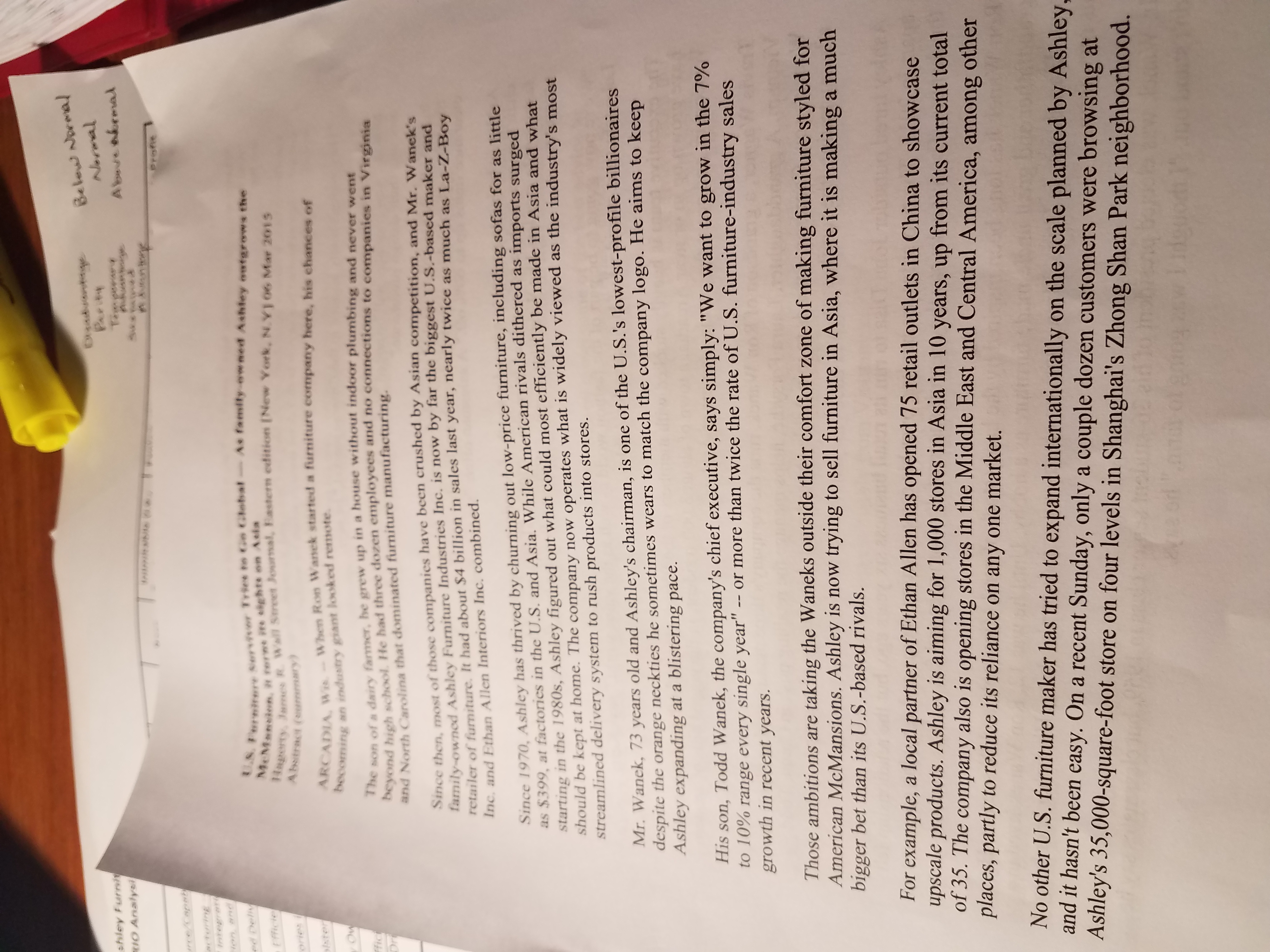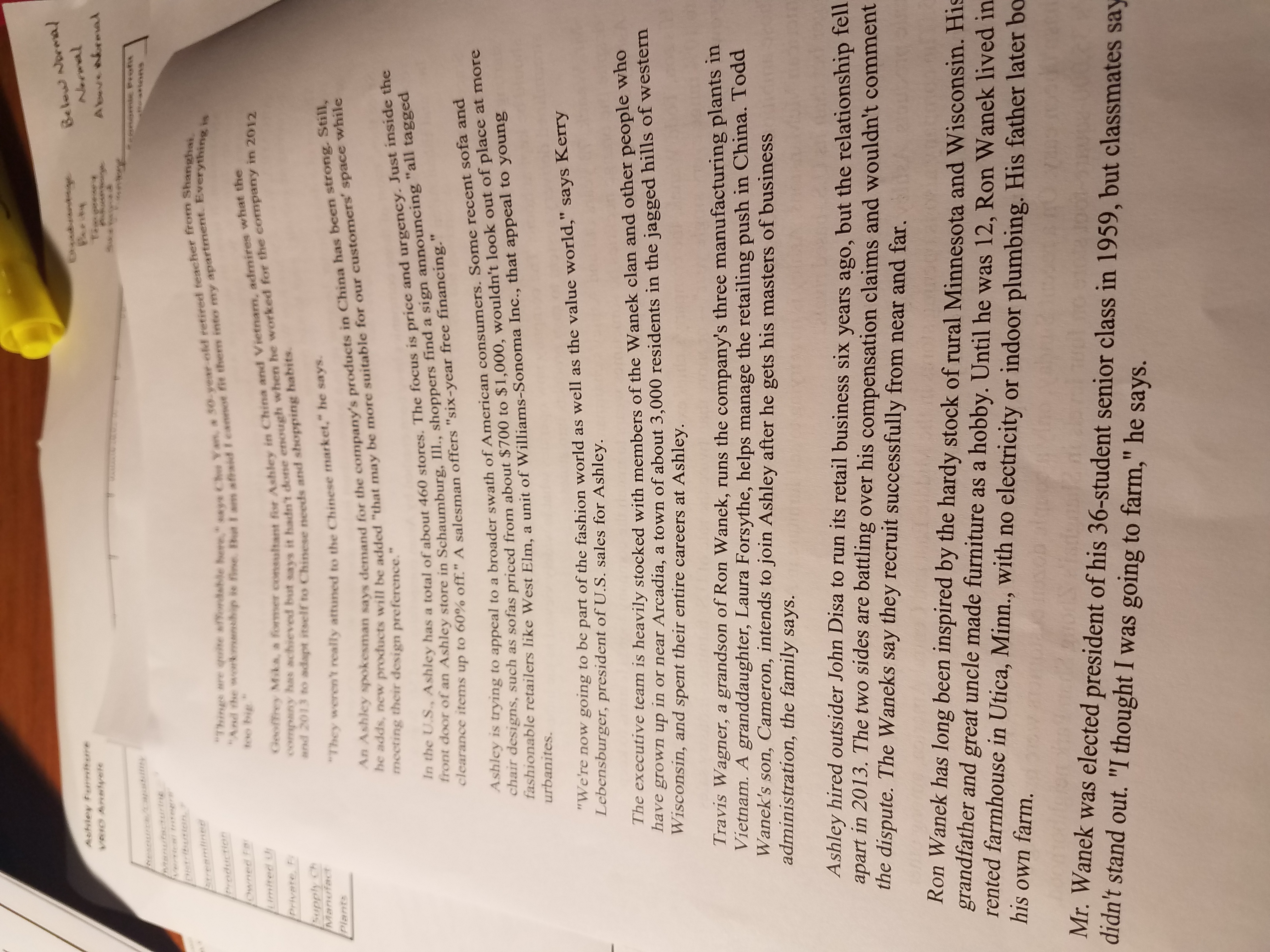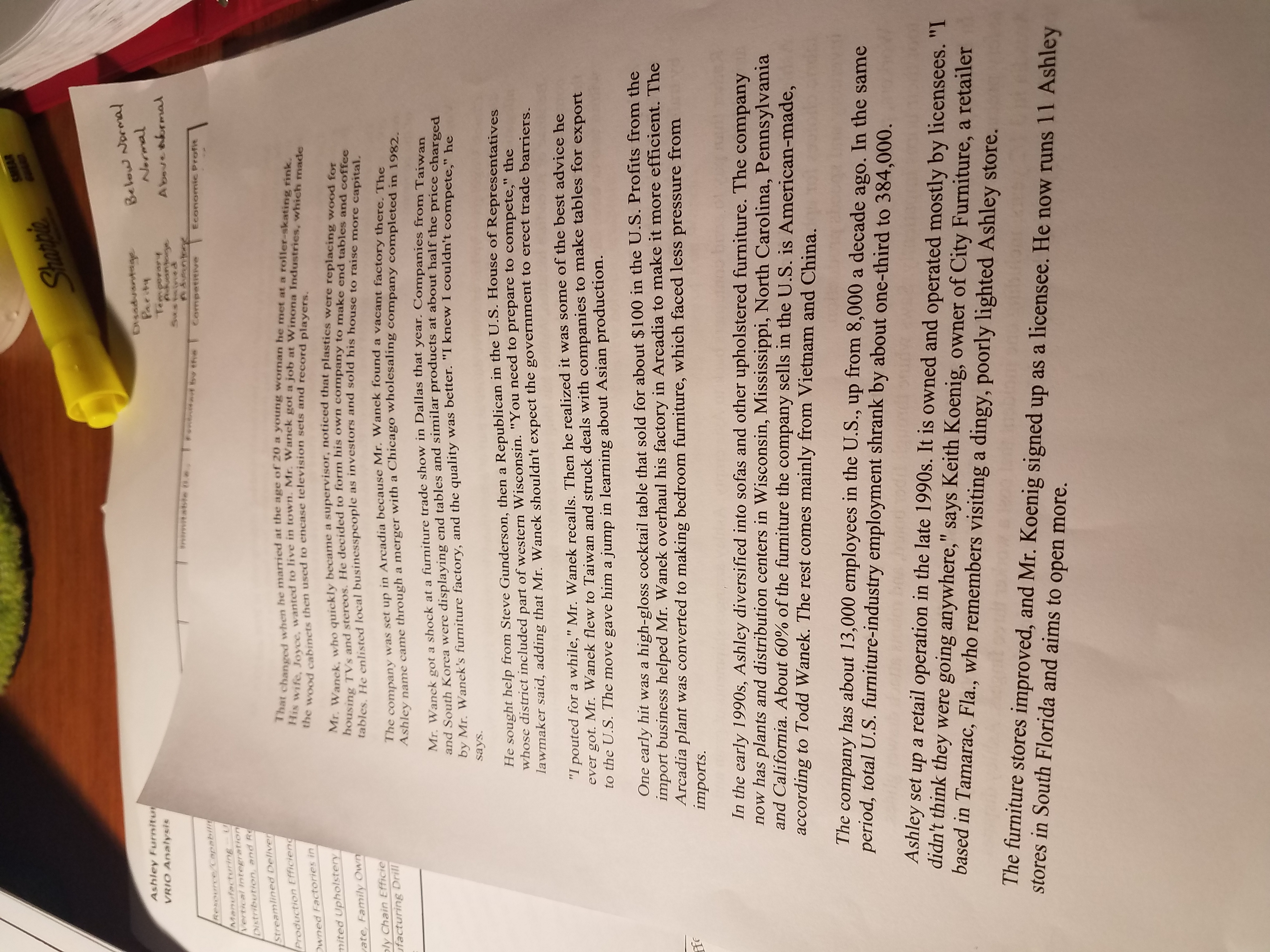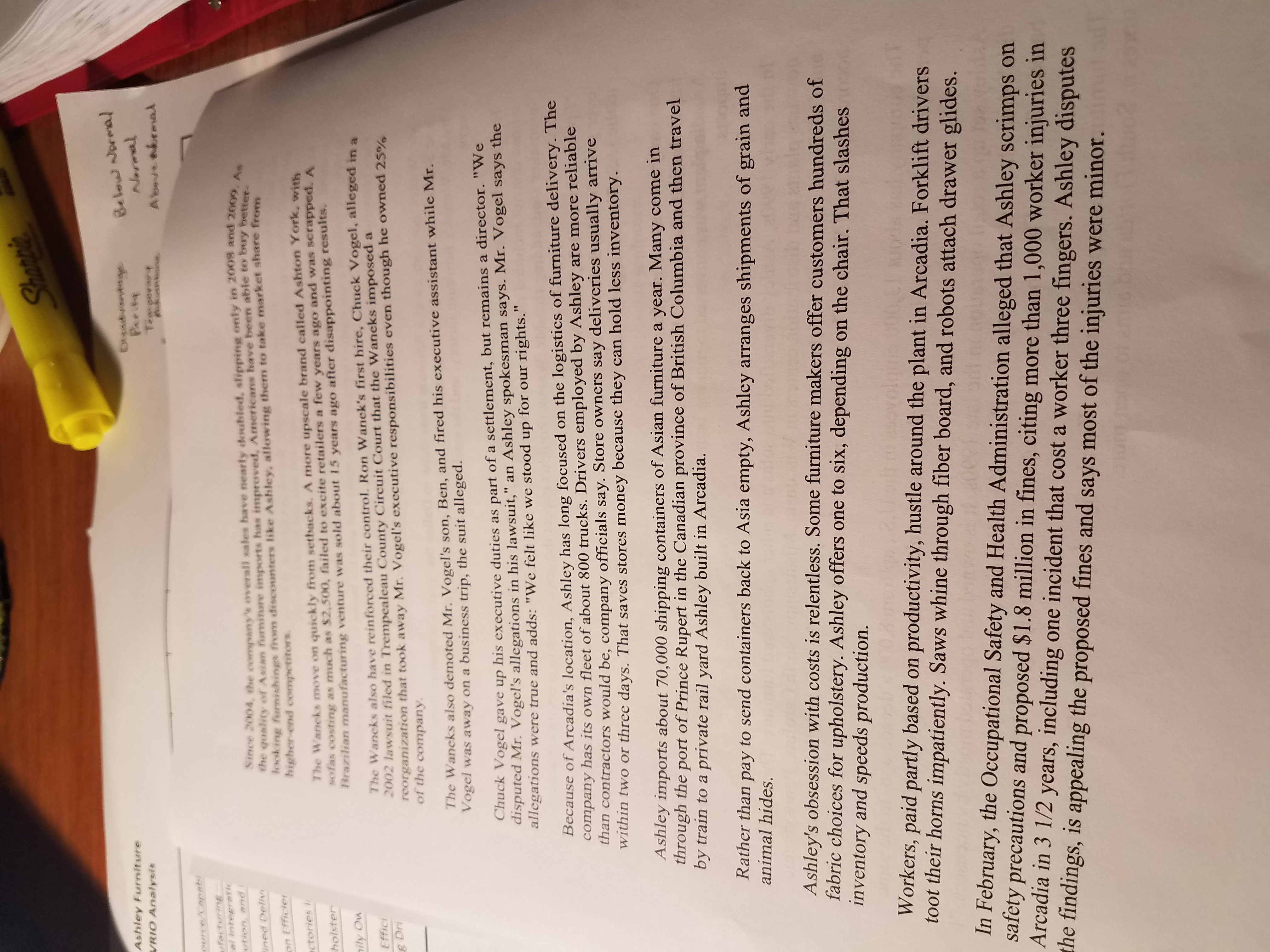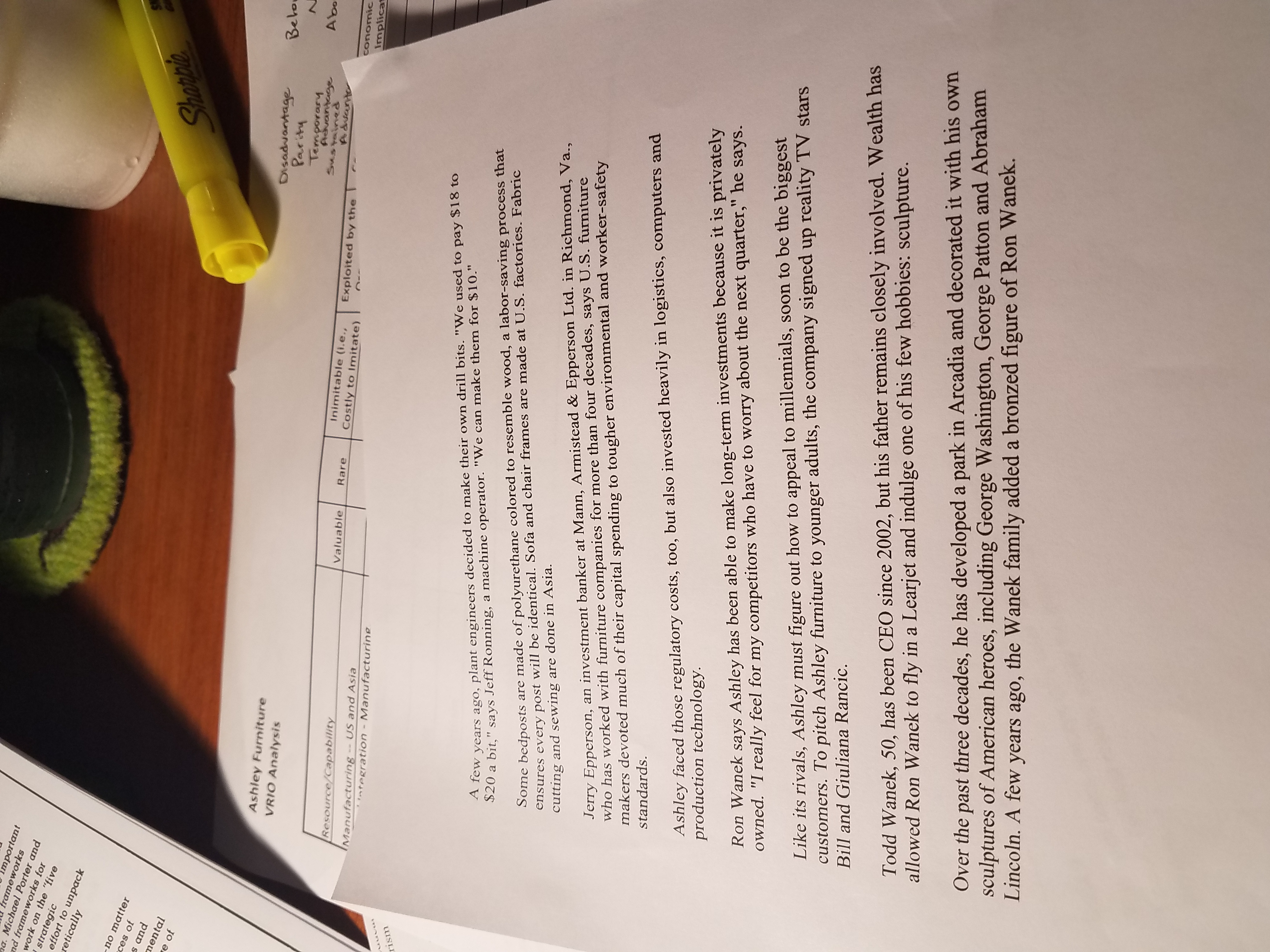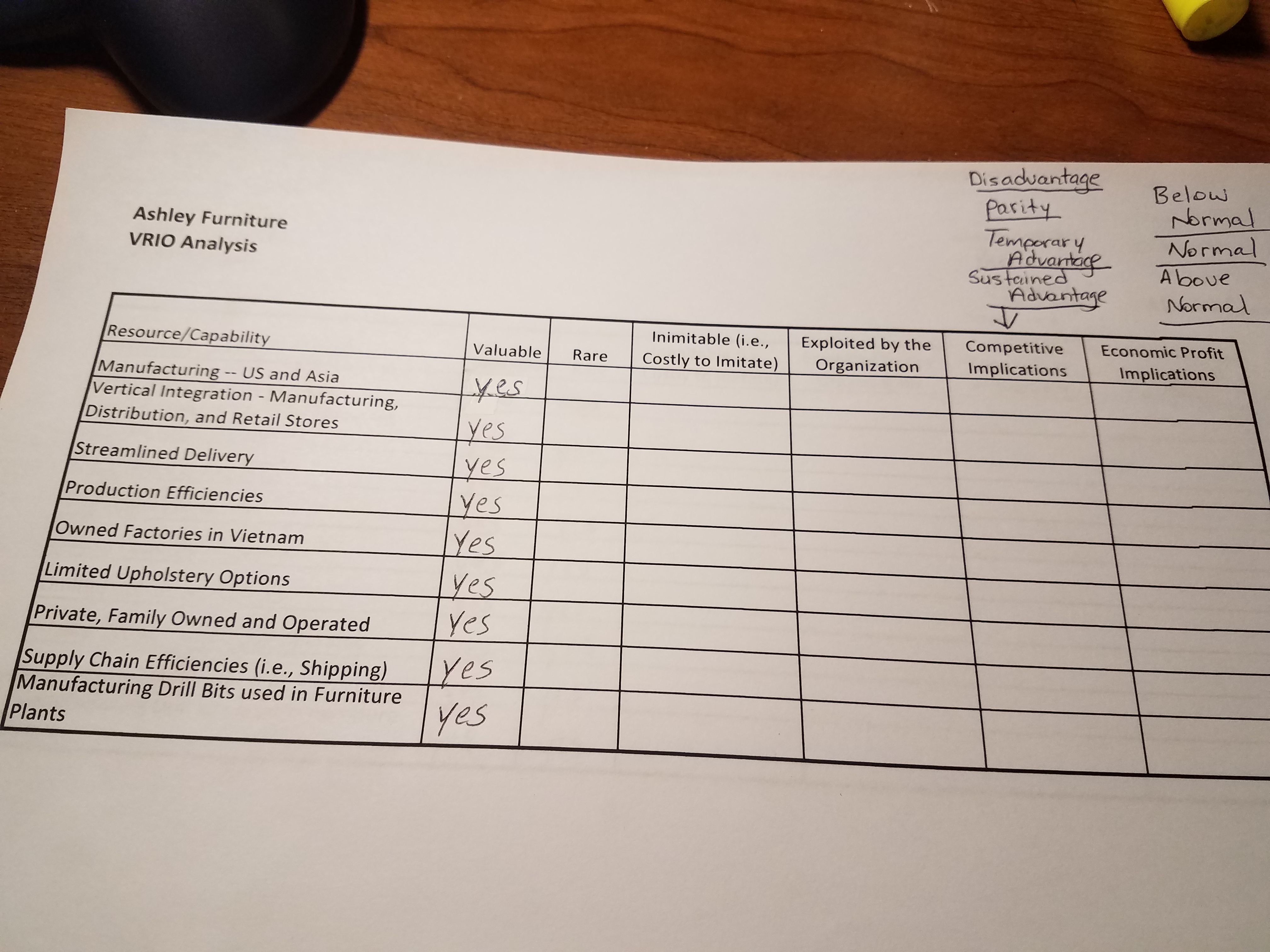With the attached article on Ashley Furniture what would a VRIO analysis look like. For this example I know V- Valuable are all yes. I also know that if I could figure out the competitive implications, that directly answers the economic implications. If am just confused on answering the rare, inimitable, exploited by the organization, and competitive implications. I am attaching a table to help in these questions.
Below Normal shley Furni IO Analyst Normal Above wrmal rce/Capon profile actoring on and d Deli Efficie US. Furniture Survivor Tries to Go Global - At family owned Ashley outgrows the MeMansion, it forwe ife sights on Asia Hagerty, James R. Wall Street Journal, Eastern edition [New York, N. V1 06 Mar 2015 Abstract (summary) ARCADIA, Wis. - When Ron Wanek started a furniture company here, his chances of becoming an industry giant looked remote. The son of a dairy farmer, he grew up in a house without indoor plumbing and never went beyond high school. He had three dozen employees and no connections to companies in Virginia and North Carolina that dominated furniture manufacturing. Since then, most of those companies have been crushed by Asian competition, and Mr. Wanek's family-owned Ashley Furniture Industries Inc. is now by far the biggest U.S.-based maker and retailer of furniture. It had about $4 billion in sales last year, nearly twice as much as La-Z-Boy Inc. and Ethan Allen Interiors Inc. combined. Since 1970, Ashley has thrived by churning out low-price furniture, including sofas for as little as $399, at factories in the U.S. and Asia. While American rivals dithered as imports surged starting in the 1980s, Ashley figured out what could most efficiently be made in Asia and what should be kept at home. The company now operates what is widely viewed as the industry's most streamlined delivery system to rush products into stores. Mr. Wanek, 73 years old and Ashley's chairman, is one of the U.S.'s lowest-profile billionaires despite the orange neckties he sometimes wears to match the company logo. He aims to keep Ashley expanding at a blistering pace. His son, Todd Wanek, the company's chief executive, says simply: "We want to grow in the 7% to 10% range every single year" -- or more than twice the rate of U.S. furniture-industry sales growth in recent years. Those ambitions are taking the Waneks outside their comfort zone of making furniture styled for American McMansions. Ashley is now trying to sell furniture in Asia, where it is making a much bigger bet than its U.S.-based rivals. For example, a local partner of Ethan Allen has opened 75 retail outlets in China to showcase upscale products. Ashley is aiming for 1,000 stores in Asia in 10 years, up from its current total of 35. The company also is opening stores in the Middle East and Central America, among other places, partly to reduce its reliance on any one market. No other U.S. furniture maker has tried to expand internationally on the scale planned by Ashley, and it hasn't been easy. On a recent Sunday, only a couple dozen customers were browsing at Ashley's 35,000-square-foot store on four levels in Shanghai's Zhong Shan Park neighborhood.Ashley Furniture Below Normal VAIO AnNiveRe Normal Above normal vertical tritegra patribution. streamlined Production "Things are quite affordable here," ways Chu Yan, a 50 year old retired teacher from Shangh Owned Fa too big " "And the workmanship is fine thin I am afraid I caninvest fit them into my apartment. Everything Imited Uj Private F Geoffrey Mika, a former consultant for Ashley in China and Vietnam, admires what the company has achieved but says it hadn't done enough when he worked for the company in 2012 Supply CH Manufact and 2013 to adapt itself to Chinese needs and shopping habits. Plants "They weren't really attuned to the Chinese market. " he says. An Ashley spokesman says demand for the company's products in China has been strong. Still, he adds, new products will be added "that may be more suitable for our customers' space while meeting their design preference." In the U.S., Ashley has a total of about 460 stores. The focus is price and urgency. Just inside the front door of an Ashley store in Schaumburg, III., shoppers find a sign announcing "all tagged clearance items up to 60% off." A salesman offers "six-year free financing." Ashley is trying to appeal to a broader swath of American consumers. Some recent sofa and chair designs, such as sofas priced from about $700 to $1,000, wouldn't look out of place at more urbanites. fashionable retailers like West Elm, a unit of Williams-Sonoma Inc., that appeal to young "We're now going to be part of the fashion world as well as the value world," says Kerry Lebensburger, president of U.S. sales for Ashley. The executive team is heavily stocked with members of the Wanek clan and other people who have grown up in or near Arcadia, a town of about 3,000 residents in the jagged hills of western Wisconsin, and spent their entire careers at Ashley. Travis Wagner, a grandson of Ron Wanek, runs the company's three manufacturing plants in Vietnam. A granddaughter, Laura Forsythe, helps manage the retailing push in China. Todd Wanek's son, Cameron, intends to join Ashley after he gets his masters of business administration, the family says. Ashley hired outsider John Disa to run its retail business six years ago, but the relationship fell apart in 2013. The two sides are battling over his compensation claims and wouldn't comment the dispute. The Waneks say they recruit successfully from near and far. Ron Wanek has long been inspired by the hardy stock of rural Minnesota and Wisconsin. His grandfather and great uncle made furniture as a hobby. Until he was 12, Ron Wanek lived in his own farm. rented farmhouse in Utica, Minn., with no electricity or indoor plumbing. His father later bo Mr. Wanek was elected president of his 36-student senior class in 1959, but classmates say didn't stand out. "I thought I was going to farm," he says.Sharpie Ashley Furnitur Disadvantage Below Normal VRIO Analysis Normal Temporary Sustained Above Normal Resource/Capability writable le . I romantonot by the | competitive Economic Profit Manufacturing Vertical Integration Distribution, and R Streamlined Deliver Production Efficient what changed when he married at the age of 20 a young woman he met at a roller-skating rink. wned Factories in His wife, Joyce, wanted to live in town. Mr. Wanek got a job at Winona Industries, which made the wood cabinets then used to encase television sets and record players. hited Upholstery ate, Family Own Mr. Wanek, who quickly became a supervisor, noticed that plastics were replacing wood for housing TV's and stereos. He decided to form his own company to make end tables and coffee ly Chain Efficie tables. He enlisted local businesspeople as investors and sold his house to raise more capital. facturing Drill The company was set up in Arcadia because Mr. Wanek found a vacant factory there. The Ashley name came through a merger with a Chicago wholesaling company completed in 1982. Mr. Wanek got a shock at a furniture trade show in Dallas that year. Companies from Taiwan and South Korea were displaying end tables and similar products at about half the price charged by Mr. Wanek's furniture factory, and the quality was better. "I knew I couldn't compete," he says. He sought help from Steve Gunderson, then a Republican in the U.S. House of Representatives whose district included part of western Wisconsin. "You need to prepare to compete," the lawmaker said, adding that Mr. Wanek shouldn't expect the government to erect trade barriers. "I pouted for a while, " Mr. Wanek recalls. Then he realized it was some of the best advice he ever got. Mr. Wanek flew to Taiwan and struck deals with companies to make tables for export to the U.S. The move gave him a jump in learning about Asian production. One early hit was a high-gloss cocktail table that sold for about $100 in the U.S. Profits from the import business helped Mr. Wanek overhaul his factory in Arcadia to make it more efficient. The imports. Arcadia plant was converted to making bedroom furniture, which faced less pressure from In the early 1990s, Ashley diversified into sofas and other upholstered furniture. The company now has plants and distribution centers in Wisconsin, Mississippi, North Carolina, Pennsylvania and California. About 60% of the furniture the company sells in the U.S. is American-made, according to Todd Wanek. The rest comes mainly from Vietnam and China. The company has about 13,000 employees in the U.S., up from 8,000 a decade ago. In the same period, total U.S. furniture-industry employment shrank by about one-third to 384,000. Ashley set up a retail operation in the late 1990s. It is owned and operated mostly by licensees. "I didn't think they were going anywhere," says Keith Koenig, owner of City Furniture, a retailer based in Tamarac, Fla., who remembers visiting a dingy, poorly lighted Ashley store. The furniture stores improved, and Mr. Koenig signed up as a licensee. He now runs 11 Ashley stores in South Florida and aims to open more.Sharpie Ashley Furniture Below Normal RIO Analysis Normal Above Normal Surce/Capat facturing sIntegratic ation, and ned Delive Since 2004, the company's overall sales have nearly doubled, slipping only in 2098 and 2009 the quality of Asian furniture imports has improved, Americans have been able to buy better n Efficier looking furnishings from discounters like Ashley, allowing them to take market share from higher end competitors. ctories i The Wancks move on quickly from setbacks. A more upscale brand called Ashton York, with holster sofas costing as much as $2,500, failed to excite retailers a few years ago and was scrapped. A ily On Brazilian manufacturing venture was sold about 15 years ago after disappointing results. Effici The Waneks also have reinforced their control. Ron Wanek's first hire, Chuck Vogel, alleged in a 2 Dri 2002 lawsuit filed in Trempealeau County Circuit Court that the Waneks imposed a reorganization that took away Mr. Vogel's executive responsibilities even though he owned 25% of the company. The Waneks also demoted Mr. Vogel's son, Ben, and fired his executive assistant while Mr. Vogel was away on a business trip, the suit alleged. Chuck Vogel gave up his executive duties as part of a settlement, but remains a director. "We disputed Mr. Vogel's allegations in his lawsuit," an Ashley spokesman says. Mr. Vogel says the allegations were true and adds: "We felt like we stood up for our rights." Because of Arcadia's location, Ashley has long focused on the logistics of furniture delivery. The company has its own fleet of about 800 trucks. Drivers employed by Ashley are more reliable than contractors would be, company officials say. Store owners say deliveries usually arrive within two or three days. That saves stores money because they can hold less inventory. Ashley imports about 70,000 shipping containers of Asian furniture a year. Many come in through the port of Prince Rupert in the Canadian province of British Columbia and then travel by train to a private rail yard Ashley built in Arcadia. animal hides. Rather than pay to send containers back to Asia empty, Ashley arranges shipments of grain and Ashley's obsession with costs is relentless. Some furniture makers offer customers hundreds of fabric choices for upholstery. Ashley offers one to six, depending on the chair. That slashes inventory and speeds production. Workers, paid partly based on productivity, hustle around the plant in Arcadia. Forklift drivers toot their horns impatiently. Saws whine through fiber board, and robots attach drawer glides. In February, the Occupational Safety and Health Administration alleged that Ashley scrimps on safety precautions and proposed $1.8 million in fines, citing more than 1,000 worker injuries in Arcadia in 3 1/2 years, including one incident that cost a worker three fingers. Ashley disputes the findings, is appealing the proposed fines and says most of the injuries were minor. imImportant frameworks . Michael Porter and d frameworks for work on the "five strategic effort to unpack retically no matter ces of and mental e of Sharpie Ashley Furniture VRIO Analysis Disadvantage Parity Belo Temporary suavevantage A bo Resource/Capability Valuable Rare Inimitable (i.e., Costly to Imitate) Exploited by the Manufacturing -- US and Asia conomi integration - Manufacturing Implica risi A few years ago, plant engineers decided to make their own drill bits. "We used to pay $18 to $20 a bit," says Jeff Ronning, a machine operator. "We can make them for $10." Some bedposts are made of polyurethane colored to resemble wood, a labor-saving process that ensures every post will be identical. Sofa and chair frames are made at U.S. factories. Fabric cutting and sewing are done in Asia. Jerry Epperson, an investment banker at Mann, Armistead & Epperson Lid. in Richmond, Va., who has worked with furniture companies for more than four decades, says U.S. furniture makers devoted much of their capital spending to tougher environmental and worker-safety standards. Ashley faced those regulatory costs, too, but also invested heavily in logistics, computers and production technology. Ron Wanek says Ashley has been able to make long-term investments because it is privately owned. "I really feel for my competitors who have to worry about the next quarter," he says. Like its rivals, Ashley must figure out how to appeal to millennials, soon to be the biggest customers. To pitch Ashley furniture to younger adults, the company signed up reality TV stars Bill and Giuliana Rancic. Todd Wanek, 50, has been CEO since 2002, but his father remains closely involved. Wealth has allowed Ron Wanek to fly in a Learjet and indulge one of his few hobbies: sculpture. Over the past three decades, he has developed a park in Arcadia and decorated it with his own sculptures of American heroes, including George Washington, George Patton and Abraham Lincoln. A few years ago, the Wanek family added a bronzed figure of Ron Wanek.Disadvantage Parity Below Normal Ashley Furniture Temporary Advantage Normal VRIO Analysis Sustained Above Advantage Normal Resource/Capability Inimitable (i.e., Exploited by the Competitive Economic Profit Valuable Rare Costly to Imitate) Organization Implications Implications Manufacturing -- US and Asia Vertical Integration - Manufacturing, yes Distribution, and Retail Stores yes Streamlined Delivery yes Production Efficiencies yes Owned Factories in Vietnam Lyes Limited Upholstery Options Lyes Private, Family Owned and Operated yes Supply Chain Efficiencies (i.e., Shipping) yes Manufacturing Drill Bits used in Furniture Plants yes
